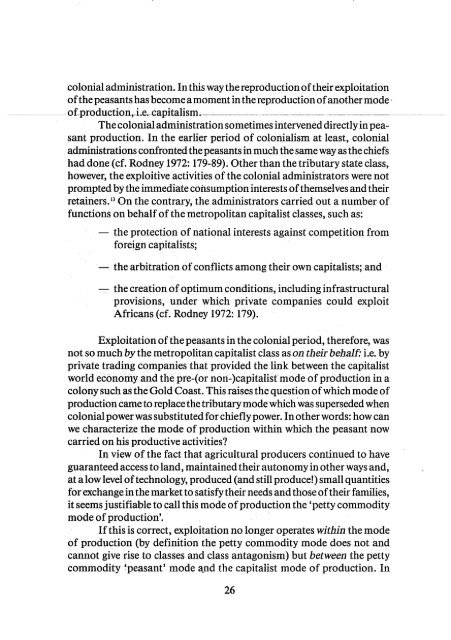Create successful ePaper yourself
Turn your PDF publications into a flip-book with our unique Google optimized e-Paper software.
colonial administration. In this way the reproduction of their exploitation<br />
of the peasants has become a moment in the reproduction of another modeotproduction,-i.e.~capitalism.--~~-~<br />
~. ---<br />
The colonial administration sometimes intervened directly in peasant<br />
production. In the earlier period of colonialism at least, colonial<br />
administrations confronted the peasants in much the same way as the chiefs<br />
had done (cf. Rodney 1972: 179-89). Other than the tributary state class,<br />
however, the exploitive activities of the colonial administrators were not<br />
prompted by the immediate consumption interests of themselves and their<br />
retainers. 13 On the contrary, the administrators carried out a number of<br />
functions on behalf of the metropolitan capitalist classes, such as:<br />
- the protection of national interests against competition from<br />
foreign capitalists;<br />
- the arbitration of conflicts among their own capitalists; and<br />
the creation of optimum conditions, including infrastructural<br />
provisions, under which private companies could exploit<br />
Africans (cf. Rodney 1972: 179).<br />
Exploitation of the peasants in the colonial period, therefore, was<br />
not so much by the metropolitan capitalist class as on their behalf: i.e. by<br />
private trading companies that provided the link between the capitalist<br />
world economy and the pre-( or non-)capitalist mode of production in a<br />
colony such as the Gold Coast. This raises the question of which mode of<br />
production came to replace the tributary mode which was superseded when<br />
colonial power was substituted for chiefly power. In other words: how can<br />
we characterize the mode of production within which the peasant now<br />
carried on his productive activities?<br />
In view of the fact that agricultural producers continued to have<br />
guaranteed access to land, maintained their autonomy in other ways and,<br />
at a low level of technology, produced (and still produce!) small quantities.<br />
for exchange in the market to satisfy their needs and those oftheir families,<br />
it seems justifiable to call this mode of production the 'petty commodity<br />
mode of production'.<br />
If this is correct, exploitation no longer operates within the mode<br />
of production (by definition the petty commodity mode does not and<br />
cannot give rise to classes and class antagonism) but between the petty<br />
commodity 'peasant' mode a,nd the capitalist mode of production. In<br />
26
















